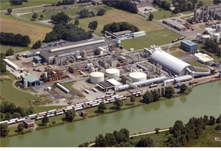Construction of the new facility will secure the long-term future of the Ibbenbüren site and that of the chemical cluster, helping to prevent a further withdrawal of industry from the region.

AkzoNobel and Evonik Industries have broken ground at the site of their production joint venture for chlorine and potassium hydroxide solution at Ibbenbüren in Germany. AkzoNobel will use the new plant to produce chlorine and hydrogen, which are essential ingredients for the chemical industry and people’s daily lives.
The ceremony was staged at AkzoNobel’s existing facility in Ibbenbüren, where the two companies will build and operate a new membrane electrolysis plant, which is due to come on stream by the fourth quarter of 2017.
Werner Fuhrmann, member of AkzoNobel’s Executive Committee responsible for Specialty Chemicals, and Ralph Sven Kaufmann, Member of the Board of Evonik Industries AG, conducted the official proceedings at the event, which was attended by customers, suppliers and employees of both companies, as well as representatives of the city of Ibbenbüren and relevant authorities.
“The state-of-the-art plant we are building will set a new benchmark for the production of chlorine and potassium hydroxide solution,” said Fuhrmann. “It will improve the ecological footprint of every ton of chlorine we produce in Ibbenbüren by 25 to 30 percent. This will result in less energy use and fewer CO2 emissions, while there will also be clear benefits for the local chemical cluster.”
Construction of the new facility will secure the long-term future of the Ibbenbüren site and that of the chemical cluster, helping to prevent a further withdrawal of industry from the region. The plant will have an annual nameplate capacity of around 130,000 metric tons of potassium hydroxide solution and 82,000 metric tons of chlorine, ensuring a reliable supply for customers.
Commenting on the partnership, Ralph Sven Kaufmann said: “This joint venture will secure Evonik’s future position in the potassium derivatives business. We have found an efficient and sustainable solution to keep on delivering for our customers.”
Both Fuhrmann and Kaufmann also applauded the close cooperation between the two partners: “It’s a source of great pride,” they said “particularly the excellent work of the joint project team, who achieved great success in a very tight timeframe.”
AkzoNobel will commercialize the chlorine and hydrogen at the new plant, or will process these products directly at the Ibbenbüren site. Evonik will take the new plant’s potassium hydroxide solution for commercialization and processing at its own site in Lülsdorf, which is where it processes potassium hydroxide solution into various products, including potassium carbonate (potash).
All production of chlorine, potassium hydroxide and caustic lye using mercury-based amalgam electrolysis has to stop by the end of 2017 due to legislative requirements. The planned new membrane electrolysis plant will use a sustainable process which has a more positive environmental profile.
Subscribe to our newsletter & stay updated.